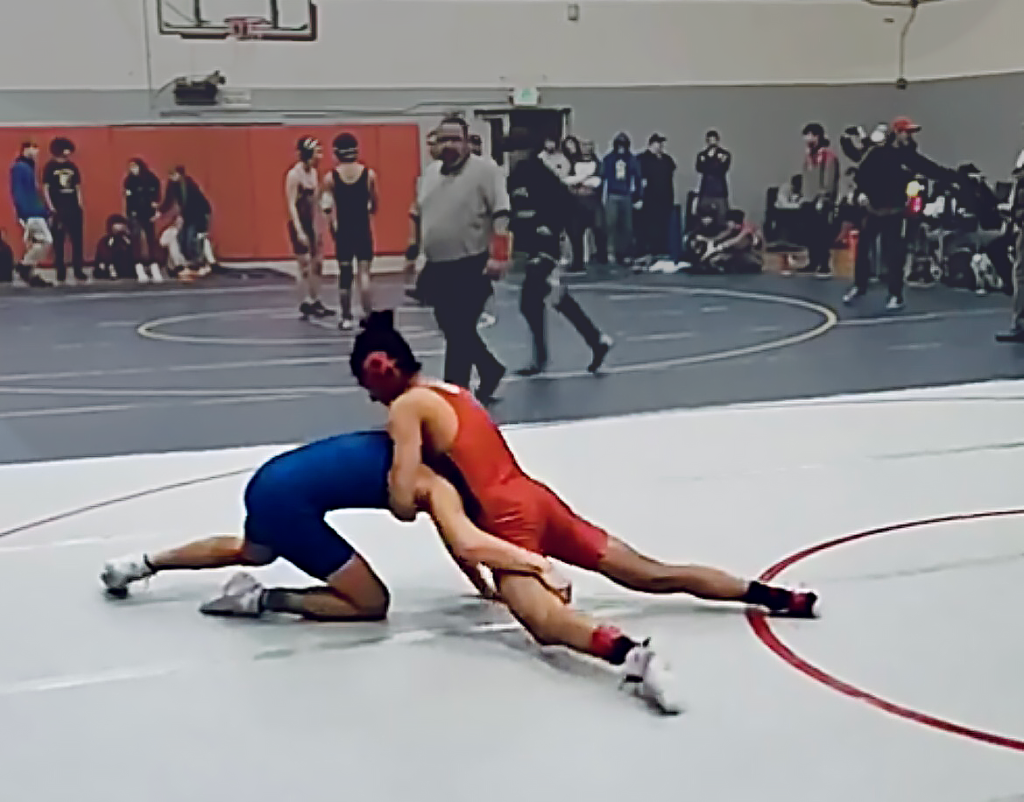Senior Tony Fernandes is a self-proclaimed class clown.
He admits he makes “dumb comments” every day in nearly all his classes, but especially in Kirk Abe’s AP Government and Economics class, an openness he attributes to interactions with Abe outside of class in wrestling and Abe’s friendly personality. Most of his top jokes in Abe’s class push the envelope.
“He’s a very friendly and open person, and he likes to banter with his students,” Fernandes said. “Normally, I wouldn’t pay that much attention to government and economics, but our friendship has definitely made the class more interesting and engaging to me.”
Both Fernandes and Abe, who was the former head coach of the school’s wrestling team from the 1990s to 2019, share a passion for the sport, an interest that’s deeply ingrained in Abe’s class culture. Whenever a student is caught with their phone out, for example, they’re “strongly encouraged” to go to the open mat to witness wrestlers practicing for their matches.
Fernandes started wrestling last November in a spur of the moment decision — one of his friends, captain Sohum Bhan, had convinced him to try out the school’s wrestling team for fun. Enticed by the prospect of “throwing people on the ground” and knowing that he didn’t have much else to do over the winter break, Fernandes agreed.
He quickly experienced the intensity of the sport in his first match, a milestone for most beginning wrestlers. While it only lasts 6 minutes, wrestlers are required to go in at 100% of their strength and energy at lightning speed without much time to process their opponents’ movements, an aspect of the sport that often throws beginners off-guard. Many are dead-tired by the end due to the heavy cardiovascular demands of the sport.
“Immediately, I forgot everything and then hoped for the best and pushed myself through it,” Fernandes said. “I was super out of control, but Mr. Abe was giving commentary on the sidelines because it was a home match. He told me to ‘break a leg’ before the match, and I thought it was really nice that he was actually there.”
Unfortunately for him, Fernandes did end up breaking a limb — his left elbow — later on in his training, sidelining him.
Gaining the skills necessary to contend on the wrestling mat is no small feat. During the season, the team practiced for three hours in the wrestling room — a small room few students have ventured into — to improve their stamina. These practice sessions often consisted of workouts called “going live,” where wrestlers fight match after match and search for new partners to train against.
Other workouts, like the Iron Man, which Fernandes cited as one of the toughest aspects of the sport, tests students’ cardio and persistence by matching pairs to train continuously for five rounds. During particularly grueling sessions, for example, a teammate had thrown Fernandes on his head, a “minor injury” that took little time to heal.
However, he also admits that injuries are an inevitable part of wrestling.
“Being afraid to get hurt will limit your mobility,” he said. “I just focus on my own plan and converse my nervousness into adrenaline.”
Ironically, while he started the sport for fun, Fernandes stuck to it for its tough nature. He plans to continue martial arts in college and hopes to try judo or jiu jitsu, Japanese grappling arts with some resemblance to wrestling.
“It’s fun because you get to throw people around, but the whole point of the sport is to literally dominate people,” he said. “It’s a really rough sport, especially in the beginning because you get beat up every day. But by sticking to it, despite its uncomfortable nature, you just do it to get better and it builds your character. It makes it easier to deal with discomfort and persevere even when you don’t want to continue.”
Abe has tried to help build the school’s wrestling culture for decades. As a winter sport, wrestling starts in December and carries through the winter break, resuming from January to the beginning of February. As a result, Abe likens wrestling to constantly running an ultra-marathon.
“It’s such a tough sport, mentally and physically,” he said. “So just seeing a wrestling student and knowing what they’re going through, I really respect that because they’re putting so much effort into it.”
After participating in the wrestling team at UC Davis for a year, Abe joined Saratoga High in the early 1990s as a teacher and assistant coach for wrestling to become more involved in the extracurriculars his students participated in. He later took some time off to spend more time with his kids, returning again in 2019 as a head coach.
Despite Abe’s short experience with wrestling in college, the intense nature of the sport inspired him to continue coaching and instill the lessons he learned to his students.
“[The sport] has taught me to always, always strive to do better,” he said. “You do what you can to reach your potential, knowing that you’re always expecting to compete to a high level. I’ve coached wrestling in the past and have so much passion for it, because I know how much dedication and hard work wrestlers go through. I’ve always been surprised at the amount of resilience my wrestling students have.”































